
So much was the same and yet so much was different this year when it came to sampling the seemingly endless cinematic delights on offer.
While I still made it to a significant number of films in actual cinemas, consuming in the process far more lollies (candy) that is good for me but is wholly and unquestionably beneficial for a peak movie-going experience, I also watched more films at home on good old Netflix, which has been castigated by a number of high-profile people for somehow ruining the way movies are made and released.
Whether you agree with the old Hollywood guard or not, the fact is that life is exhausting and much as I would like to see every movie in a cinema because it’s dark, escapist and a million miles away from the thousand things begging to be done when I’m home in my apartment, there is something undeniably alluring about slumping on the couch in your pajamas and watching a film with wine and dinner withing easy reach.
Still, for all that movies in actual cinemas remained my dominant mode of movie consumption this year because I am, at heart, a social beast and seeing films with people, particularly many of the fine examples listed below, enriches the whole experience immeasurably.

I saw this on New Year’s Eve as part of a preview session and it was thankfully every bit as otherworldly, substantial and romantically transportive as the hype suggested. It helps of course that Guillermo del Toro directed it, imbuing this gritty fairytale with a lustre and authenticity of experience, despite it’s magically-real elements, that had me exclaim in my review that The Shape of Water offers “a glimpse of how powerful [life and love] can be, of how immensely important and real they are in ways that a commercialised holiday in mid-February has no hope of coming close to matching.”
Here’s my full review of The Shape of Water.
 (image via IMP Awards)
(image via IMP Awards)
As a gay man, seeing love, romance, and yes, even sex, as I have experienced it explored in a mainstream film with real insight and understanding is a rare thing indeed. The joy of Call Me By Your Name, about the romance between an archaeology professor’s son and a visiting US graduate student is that it is not only authentic and aching with all the possibility, agony and ecstasy that true love brings but that it does it so sensually and beautifully, every frame a visual and lyrical love letter to romance and the way it doesn’t always work out as planned, no matter how hard we wish for it.
Here’s my full review of Call Me By Your Name.
Three Billboards Outside Ebbing, Missouri
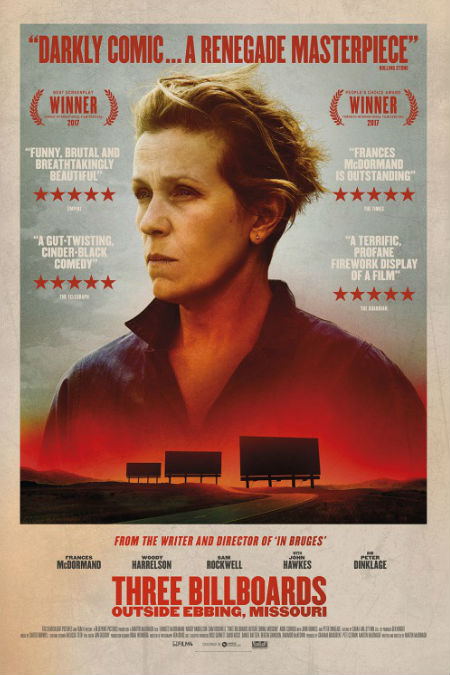
Grief is a messy, unpredictable business that never plays out the same way for anyone. In the case of Mildred Hayes (the superlative Frances McDormand who won an Oscar for her affecting performance), who is mourning the still-unsolved murder of her teenage daughter Angela (Kathryn Newton), it manifests as a state of being so all-consuming that “that coming for air, thinking rationally or putting aside her neverending rage is all but impossible.” What results from that are three billboards blatantly accusing the police chief, played by Woody Harrelson, of wilful inaction and the world of not caring enough. It’s powerful stuff that envelops you from the word go, not letting go until Mildred finds a very unorthodox form of release.
Here’s my full review of Three Billboards Outside Ebbing, Missouri

This quirky, beautifully well-written film is one the standouts of Netflix’s seemingly endless torrent of original movies. Set in Brooklyn and featuring Jessica Williams as an ambitious playwright who has not yet achieved her dreams of theatrical stardom and who is without a boyfriend after ending a longterm relationship that has dwindled away to nothing. The protagonist can be bluntly overwhelming at times, almost objectionable but thankss to a witty, clever script and a captivatingly immersive performance by Williams, the film reinvents the tropes of the romantic comedy genre, giving us a cinematic treat that is possessed of an “in-your-face vibrancy that never flags or loses potency.”
Here’s my full review of The Incredible Jessica Jones.
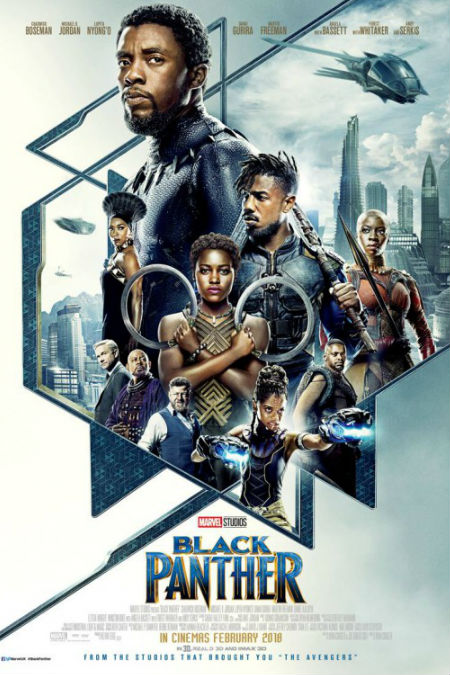
Marvel has got the art of making superhero films down to a fine art. That’s a both a good and bad thing – you know what you’re going to get and it’s invariably well-made but increasingly there is a sense of sameness, of surprises vanquished in pursuit of McDonalds-like pleasing uniformity. Black Panther, rather happily, blows the template significantly-enough out of the water that we are gifted with a hero who is a person of colour (played by Chadwick Boseman), an African nation in Wakanda that is advanced, both technologically and societally, and a story that is never less than consumingly-engaging. It’s fresh, vibrant and alive with possibility, everything a superhero film should be.
Here’s my full review of Black Panther.
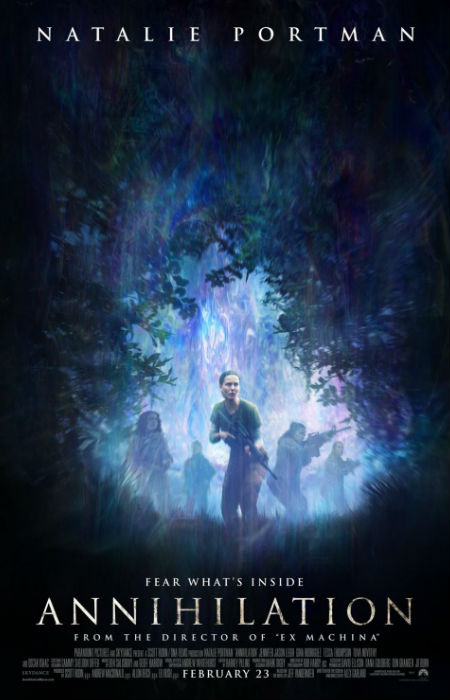
Who or what constitutes an enemy and are we as people, programmed to see things as either fight-or-flight entities, able to properly judge whether something beyond our experience is friend or foe? That’s the great question at the heart of Annihilation which takes us into the alien confines of The Shimmer where our perceptions and sense of self are played with to the point where we don’t know which way is up, which is down, and if anything makes sense anymore. It’s a challengingly-weird but richly-rewarding film that makes the salient point that we never really know who we are until we are close to losing everything that makes us human.
Here’s my full review of Annihilation.

Love, Simon hit me deeply. You could say that many films do – I rarely view movies so much as live them thanks to my deeply-emotional sense of self – but this story of one young man’s coming out experience was everything I wished my story could have been, filled with elements common to anyone who has had to tell the world “I’m not straight”. It’s a ludicrous demand to make of anyone but it’s what happens and in Simon’s case happens in high school in ways over which he has little to no control. It’s funny, touching, real and wholly-affecting, offering hope that one day everyone will be able “to find a place in the world that is theirs and theirs alone” and be accepted without question for it.
Here’s my full review of Love, Simon.

Oh how I love Deadpool and Ryan Reynolds devotedly off-the-charts performance which is funny, emotionally-affecting, raunchy and so far away from the superhero template that it might as well be its own gloriously “fuck you!” genre. So different is it to just about everything else that I described it’s arrival into the public consciousness thus:
“Well, more currently at least, Deadpool 2, which has roared into cinemas, dragging the entrails of its genre conventions, social niceties and a truckload of witty oneliners and devastatingly clever pop culture references in its sassy, and oft times, surprisingly heartfelt wake.”
Here’s my full review of Deadpool 2.
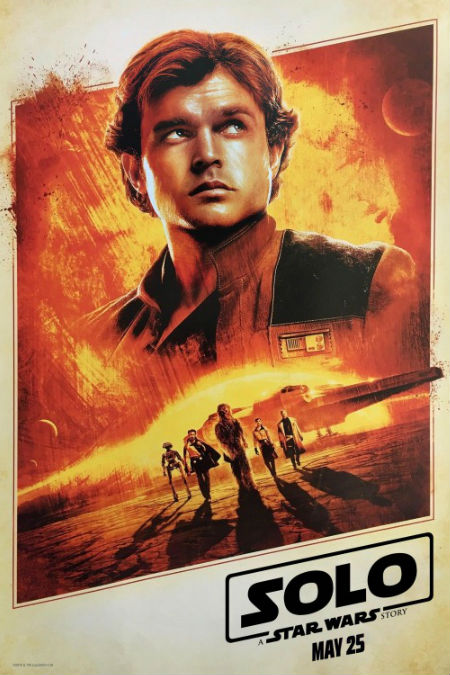
Oddly, this standalone Star Wars adventure didn’t get anywhere near as much loving as you’d expect and under-performed at the box office. Why I can’t fathom. It’s daring, fun, possessed of a spirit of gung-ho adventure that recalls the magically-escapist joy of A New Hope/The Empire Strikes Back/Return of the Jedi and gallops along with the sort of brio that can’t help but bring a great smile to your face. You end up loving the character of Han Solo all the more, which when you think about the role of a backstory, is job well and truly, and resoundingly, well done.
Here’s my full review of Solo.

All of us reach a point in our lives where the things that once brought us pleasure, the relationships that once filled our days with joy and comfort and the things we thought we knew to be true, pale and seem to fall away to nothing. We can react to this inevitability by fighting back or by simply trying to push through the weight of lost expectations and the protagonist in Marc Turtletaub’s gently-moving drama, Agnes (Kelly Macdonald), initially chooses the latter until the arrival of Robert (Irrfan Khan) into her life makes the former option look like a tantalising possibility.
Here’s my full review of Puzzle.

It’s tempting to think of action blockbusters as just big, dumb fun and while that’s true of many of them where things happening is valued more highly than the people they’re happening to, the Mission Impossible franchise is different. It’s always, rather winningly, worn its heart quite firmly on its sleeve, whether it’s dangling out a tower or a plane, and Mission: Impossible Fallout is a standout example of this richness of storytelling. It is, I declared rather passionately in my review, “a winningly-appealing cinematic experience that understands that we need a heaping, helping dose of humanity if we’re to give a damn about the world being saved (again) at all.” Amen to that.
Here’s my full review of Mission: Impossible Fallout.

I am long time fan of anything Pixar, believing that when the studio is at its best, at it often is, that’s it as good as any of the dramas with which it often shares cinema time. That even applies, rather miraculously, to its sequels which come very close, far closer than most Hollywood properties anyway, to be as fresh, alive and enjoyable as the film that began it all. Incredibles 2 is very much in the brilliantly-good sequels camp, a richly-told story that brought back the Incredibles family so well that it lead me to exclaim:
“Incredibles 2 is proof positive, that you can go back, that sequels can work, especially if you take the time as Bird and Pixar clearly have done, to build on everything that was so good about the first film, extend and parlay into something even better, and to continue to tell the kind of stories that dazzle the senses even as they burrow, Underminer like (yes he’s back too!), into your heart.”
Here’s my full review of Incredibles 2.

Quiet storytelling is increasingly being left behind in TV and cinema, addicted, as both mediums are, to fast-and-furious narratives that shock and immerse, overwhelm and tantalise. Leave No Trace, about a military veteran who’s fled society for a life of the land in the woods of the US Pacific Northwest, taking his now-teenage daughter with him, seems to exist in real time, telling its story in a beautifully-moving, unhurried pace (even when big life moments happens), drawing you in so completely that you rediscover what it is to be connected and human all over again.
Here’s my full review of Leave No Trace.

Rom-coms are either very good or not that good at all, with very little room in the middle. While Juliet, Naked isn’t a perfect exemplar of the genre, it does have a lot of good stuff going for it as I noted in my review:
“Punctuated with some witty, awkward dialogue, sterling performances from all the main performers (Byrne as Annie and Robertson as Jackson are standouts), and a grounded sense of the tug-of-war between playing it safe and going for broke, Juliet, Naked, is an ineffable pleasure, a rom-com with substance and insight that colours its romance with the possible and the real while infusing just enough rose-tinted wonder to make it an aspirationally-pleasing real joy to watch.”
Here’s my full review of Juliet, Naked.

This film was so much fun! A refreshingly-diverse take on the rom-com form, it gave us a witty, clever script that was never less than buoyantly-entertaining, memorably comic but very human characters, love true love and some sight gags that made you want to leap onto the screen and enjoy all the fun. The music is an absolute treat too, and so is it’s potent but adroitly-delivered message that love is universal and transcends just about everything, including possibly entrenched old money and fossilised attitudes.
Here’s my full review of Crazy Rich Asians.

Hearts Beat Loud is a quietly-affecting film about a father and a daughter who are at crossroads in their lives, both separately and together. The daughter’s trajectory is obvious in a sense – she’s off to college, a talented musician with all kinds of opportunities beckoning; dad though is at an uncertain place, that weird moment in middle age where life is not over but you’re not entirely sure what to do with the rest of it … and who to do it with. It’s the central bond between these two, and the unceasingly clever and witty rapport, that fuels this gem of a film.
Here’s my full review of Hearts Beat Loud.

Disney has a current bottom-line loving mania for live action remakes of many of its animated properties. Leaving aside the issue of whether this should be done when there are so many original stories out there to be told, sometimes this approach does yield some beautiful cinematic experiences such as Christopher Robin which was an unmitigated heartfelt joy:
“Christopher Robin is thus a supremely charming joy, a beautifully-imagined and gorgeously-expressed film that understands nostalgia exists because we have misplaced something in the present, and suggests, with garrulous sincerity, that maybe all we need to do is bring our past and present together and wait to see what happens.”
Here’s my full review of Christopher Robin.

Life presents us with all kinds of things good and bad, giants of the heart and the mind, that either make us or break us. In I Kill Giants, it is grief laying waste to the established landscape of a person’s life, using magical realism and CGI to create a deeply-moving portrait of change and loss that is at once escapist and yet immensely melancholic and true, and never less than utterly impactful.
Here’s my full review of I Kill Giants.
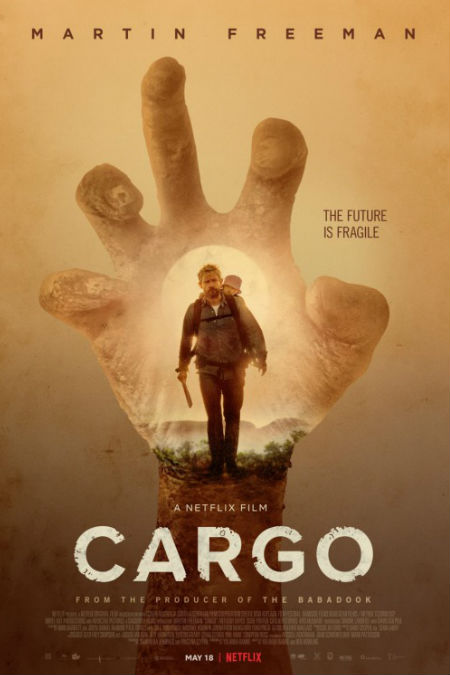
Are there any fresh takes left on the zombie apocalypse? There are – The Girl with all the Gifts, Anna and the Apocalypse, and Cargo, a film set in the Aussie outback which features an infected father, grieving the very recent loss of his wife, trying to find a safe haven for his baby daughter. It’s a character-driven, action-packed film that also takes its time creating a sense of time and place, possessed of such rich, affecting humanity that you are in tears by the end, witness to the very worst but also the very best of what makes us human.
Here’s my full review of Cargo.

A quiet film that packs a massive emotional punch, Shoplifters explores the dynamics of how the family we make often transcends the family into which we are born, and how, until you look closely, it is often hard to tell the two apart:
“Shoplifters is not a message-drive film as such, possessed as touched on before, by a script too emotionally-insightful and societally-observant to be that simplistic or rote; what it does do, in ways that quietly and yet profoundly move you, is pen a love letter to what family can be when people really need each other, when the construct is a haven rather than a naturally-occurring burden and when they really appreciate how good it is to have a haven in the awful storm that is life more often than it’s not.”
Here’s my full review of Shoplifters.
Two late additions to the honour roll that will totally wreck the evenness of the 20 favourite films headline … loved A Quiet Place, tension and terror that never put a silent foot wrong and Mary Poppins Returns, a beyond superlative sequel that proves you can go back again and it will be as wonderful as ever.
Want to see scenes from some of 2018’s biggest films in one fantastic montage? You’re in luck thanks to Irish video editor James Casey of The Solomon Society …